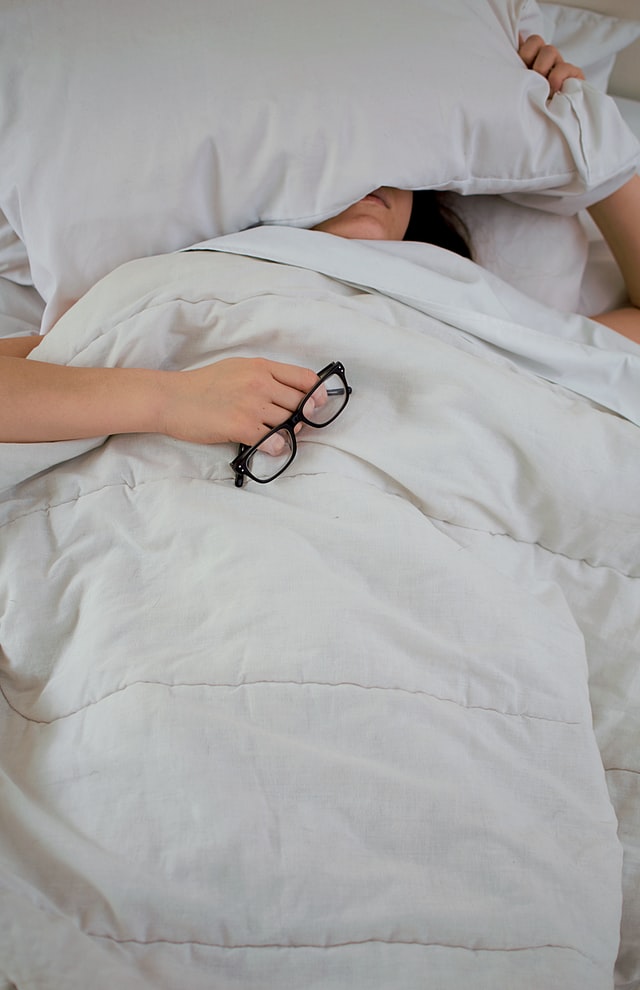What Is Snoring?
Snoring is noisy breathing while you sleep. It is a common sleep disorder that affects about 15% of the population. It occurs when the soft tissue in the back of your throat vibrates and causes air to escape through your nose or mouth or both, making it sound like a snore.
Snoring can be caused by many different things including an enlarged tonsil, nasal polyps, allergies, sinusitis, poor oral hygiene, obesity, and other health conditions like sleep apnea.
Snoring is a common condition that affects people of all ages, but more often in men and those who are overweight. It becomes worse with age as the tissues become loose and floppy. Given this information, it’s easy to see why snoring can be a problem for your partner or yourself if you’re trying to sleep soundly at night.
The good news is there are some steps you can take before bedtime which will help prevent snoring from occurring during the night hours!
Causes of snoring
More common causes
There are many causes of snoring, but the most common cause is the collapse of soft tissues in the throat. The other causes include structural problems, nasal obstruction, and medication side effects. Additional causes of snoring could be sleeping position, an obstruction in the throat or nose, and other physical factors.
There are many medical causes of snoring, which include sleep apnea and gastroesophageal reflux disease.
If you’re overweight, smoking or drinking too much alcohol can also contribute to this condition.
What are the more serious causes of snoring?
The most common causes of snoring are sleep apnea and enlarged tonsils. These conditions can be treated or prevented with a variety of different treatments, including surgery.
Sleep Apnea is the cessation of breathing during sleep, while Primary Snore occurs when there’s a blockage in one or more airways that would otherwise allow free passage to breathe. It can also be caused by enlarged tonsils or adenoids.
When a person suffers from sleep apnea, it can be caused by several factors. The most common causes are obesity and lack of oxygen in the bloodstream during sleep (obstructive). However, there are more serious causes like heart disease or chronic pulmonary diseases that need to be addressed before seeking treatment for snoring.
Sleep position
Sleep position is an important factor in the overall health of your body. For instance, what you sleep on will affect how deeply and effectively you sleep, so it is important to try different sleeping positions until you find one that works well for you. Sleep position can also cause headaches and restless leg syndrome in addition to snoring problems.
How to link cause and cure
There are many causes of snoring, but it is important that you monitor your patterns and identify the type. Some sleep patterns can be identified through a sleep diary or using a tracking app. Once you have found the cause of the snoring, there are ways to prevent it from happening again.
Different types of snoring usually have different causes. For example, sleep apnea and allergies can cause a person to snore loudly. To cure this type of sleeping disorder, the patient should first try some lifestyle changes such as diet and exercise before seeing a doctor for more intensive treatment options like surgery or medication.
How to reduce snoring
If you and your partner are both experiencing snoring, it can be difficult to sleep. To reduce the likelihood of snoring, try sleeping on your side or with wedges between your mattress and headboard to raise your head. If this does not work for you, consider buying an adjustable bed base that is more expensive but effective in reducing snoring. Avoid alcohol and sedative medications before bed as they may cause a disruption in breathing patterns that lead to snoring.
In addition, a good night’s sleep is important for your health and the quality of your life. If you have been struggling with snoring that has been disrupting sleep, then why not try to lose weight? By losing weight it helps some people stop their snoring as well as improve breathing during sleeping.
Bedtime remedies to help you stop snoring
Bedtime remedies can help you stop snoring. This includes things like sleeping on your back, using a tennis ball to keep your nose open while you sleep, and avoiding alcohol before bed.
Some people may be wondering what the tennis ball is for. It’s actually a bedtime remedy that you can use to stop snoring by placing it under your pillow and sleeping on top of it.
Here are some other natural remedies you can try if it is happening every night:
- Drink a glass of warm milk before bedtime; this will relax the throat muscles.
- Take a cold shower right before going to bed. This will constrict blood flow in the head and neck area.
- Use a humidifier to keep the air moist in your bedroom.
Neti pots are used for nasal irrigation, and they can help prevent snoring. They use salt water to open the nostrils and flush out any mucous or other unwanted materials that may be in your nose. Some remedies might include drinking a glass of warm lemon juice with honey every morning, eating spicy foods such as cayenne pepper before bedtime, trying yoga poses during sleep (for example child’s pose), and running outside at night when it is cool so you do not overheat.
Medications
MADs and TRDs are typically prescription devices that can help reduce snoring. The MAD is a mandibular advancement device, which provides an opening for air to pass through the mouth while sleeping by holding your jaw in place.
The most common types of prescriptions needed include:
- BOTOX injections (for those with mild cases)
- Sinuplasty (for those who use CPAP machines)
Surgery is not a solution for everyone and it’s invasive and costly. There are other ways to prevent snoring that don’t require surgery or any type of medical procedure.
Lifestyle changes
Lifestyle changes can be difficult, but they are very rewarding. There are many benefits of losing weight and making other lifestyle changes to reduce snoring, such as getting more sleep, exercising, and avoiding alcohol or coffee before bedtime.
When to see a doctor about snoring
Snoring is a very common issue that affects many people. The symptoms of snoring vary but the most common are heavy breathing, gasping or wheezing, and an uncomfortable feeling in your throat during sleep.
There are two forms of snoring: apnea and hypopnea. Apnea refers to the complete cessation of airflow through one’s nose or mouth while sleeping, which can cause suffocation with oxygen deprivation causing brain damage or even death if left untreated for too long. Hypopnea refers to a temporary cessation of breathing during sleep.
If you experience any of the symptoms listed above, it is recommended that you see a doctor as soon as possible before they worsen or become permanent.
The key to preventing snoring is by addressing the cause of it. In certain cases, a doctor can perform some tests and prescribe some treatments for those with upper airway resistance syndrome (UARS). Those who have been diagnosed as suffering from OSA need to be on a treatment program that includes both lifestyle modifications and medication.
What to do if you have sleep apnea?
Living with sleep apnea can be difficult because of the different types of sleep apnea, the treatment options, and how to cope with its effects.
Some people fall into a category known as obstructive Sleep Apnea which is characterized by loud snoring during sleep. This type of Sleep Apnea causes difficulty breathing, often leading to excessive daytime fatigue. The most common early detection method for this condition is following guidelines for screening. Symptoms include:
– Loud snoring throughout the night (obstructive sleep apnea)
– Daytime fatigue
– Excessive daytime sleepiness
Furthermore, according to the Centers for Disease Control and Prevention (CDC), one in five adults suffers from sleep apnea. This disorder is characterized by pauses in breathing or shallow breaths during sleep which can cause fatigue and mood swings.
The good news is that it’s also preventable with a CPAP machine, which supplies air through a mask while sleeping. The device will ensure stable oxygen levels throughout the night and help reduce snoring since you’re not holding your breath when asleep!
Understand your sleep apnea risk level
Sleep apnea is a common disorder that affects 30 million Americans. Symptoms of sleep apnea include daytime sleepiness or fatigue, difficulty with concentration or memory among many others. Risk factors for snoring and sleep apnea include being a man, being overweight, alcohol abuse, and smoking cigarettes.
In addition, people who have a long soft palate or large tonsils are at higher risk for obstructive sleep apnea. Alcohol increases the risk of snoring by relaxing throat muscles and having nasal problems can also increase the risk of snoring.
It is important to identify if you have any underlying health conditions that could be contributing to poor breathing during sleep so they can be treated before it becomes an issue.
Surgery for snoring
Snoring is a condition where an individual’s airway becomes obstructed, causing the person to breathe through their mouth and nose. There are many different causes for snoring, but one of the most common ones is a deviated septum. If this happens enough, it can cause sleep apnea which can be treated with surgery.
Surgery would involve repositioning the soft tissue in that area so that there is no obstruction or pressure from it to prevent sleep apnea from occurring.
There are a few other treatments that you can try before going for surgery. One of those is nasal strips, which will help to stop the snoring from happening by keeping the airway open and lessening obstruction in your throat. It’s not as invasive as surgery but it doesn’t have any side effects with long-term use either, so this might be something worth trying out first.
Last thoughts
Do you have a beloved family member who snores? It’s not just annoying, it can be downright disruptive. One of the worst parts about being married to someone with sleep apnea is how many times I’ve had to deal with listening for hours upon hours on end and never getting any rest myself.
Feel free to share this article with your loved ones and perhaps they’ll be a step closer to solving their snoring problem!




